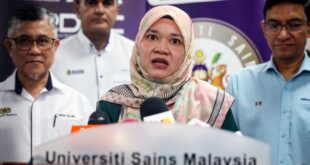KUALA LUMPUR: The Inland Revenue Board (IRB) will monitor the information of individuals with offshore accounts and ensure that they pay their taxes.
Its chief executive officer (CEO), Datuk Dr Abu Tariq Jamaluddin, said such measures were based on information received periodically from tax authorities worldwide.
“Checks and intelligence will be conducted to ensure that taxes are paid for all offshore savings if such savings are derived or from activities within the country.
“If there is any indication of tax noncompliance, the case will be channelled to the audit and investigation team for further action,” he said in his speech at the IRB engagement session with the media at Sunway Putra Hotel on Thursday (Feb 15).
Abu Tariq said they would also check the individual’s offshore accounts and domestic assets before comparing them with their tax declaration.
“If it seems that it doesn’t match with their assets and disclosures, we will conduct further reviews.
“We will check if they have paid their taxes for their savings. If it originates from Malaysia and has yet to be paid, we have cause to conduct further reviews to ensure that taxes have been paid,” Abu Tariq said.
In other developments, he said that 64,748 voluntary declarations with a total assessment or duty worth RM573.476 million from new and existing taxpayers were made through the Special Voluntary Declaration Programme 2.0 as of Jan 31.
“Taxpayers who sign up with the programme will not have penalties imposed, their declarations are received sincerely, and there will be no further review conducted for income tax payment reports made,” he said.
Abu Tariq also said the government announced the mandatory implementation of e-Invois for taxpayers with annual incomes or sales of over RM100 million from Aug 1, 2024, followed by taxpayers with RM75 million and above from Jan 1, 2025, with the rest from June 1, 2025.
“The implementation in stages will boost the efficiency of business operations and the level of compliance among taxpayers, reduce manual process and errors as well as simplify tax reporting matters,” he added. – BK
 BeritaKini.biz Berita Viral Terkini di Malaysia
BeritaKini.biz Berita Viral Terkini di Malaysia





